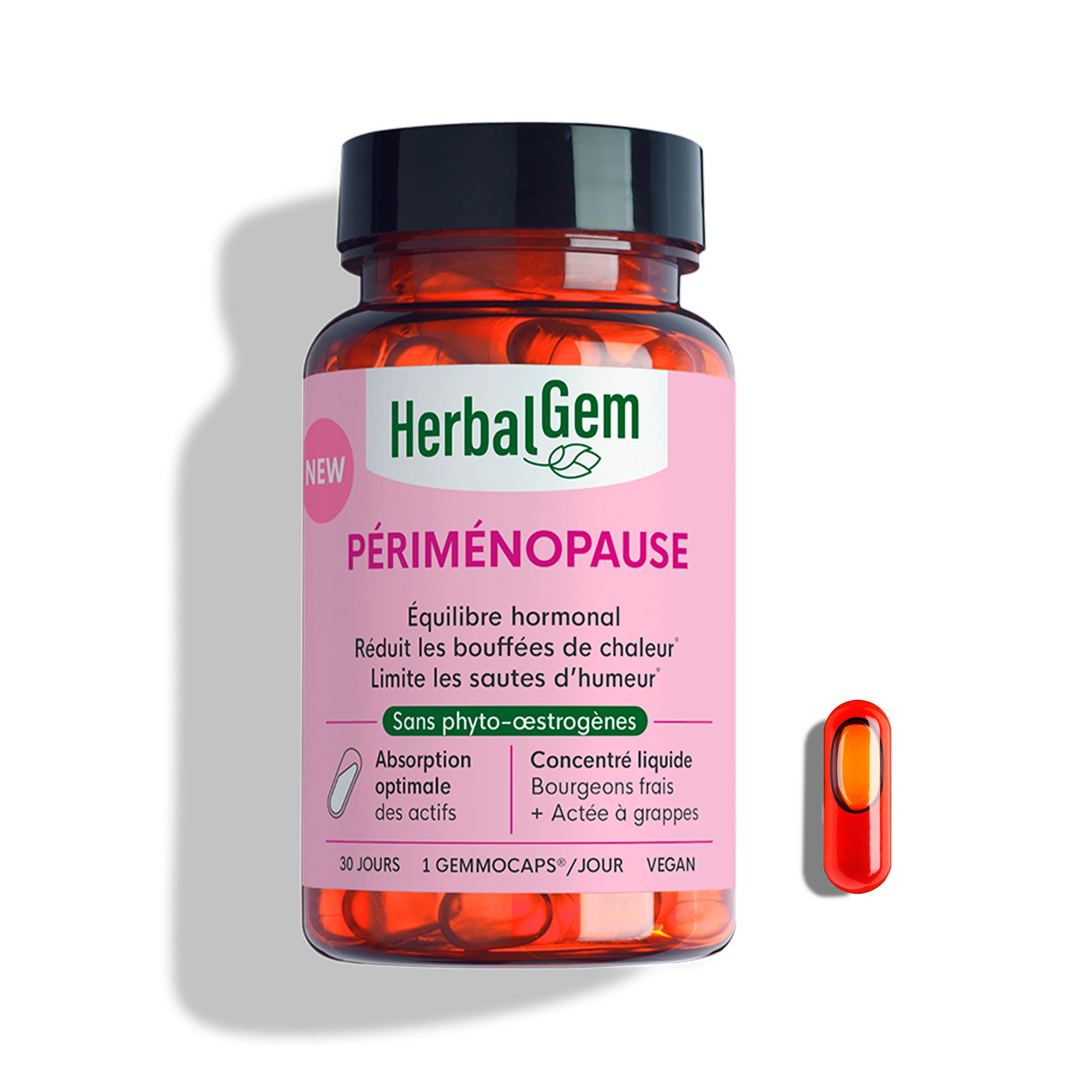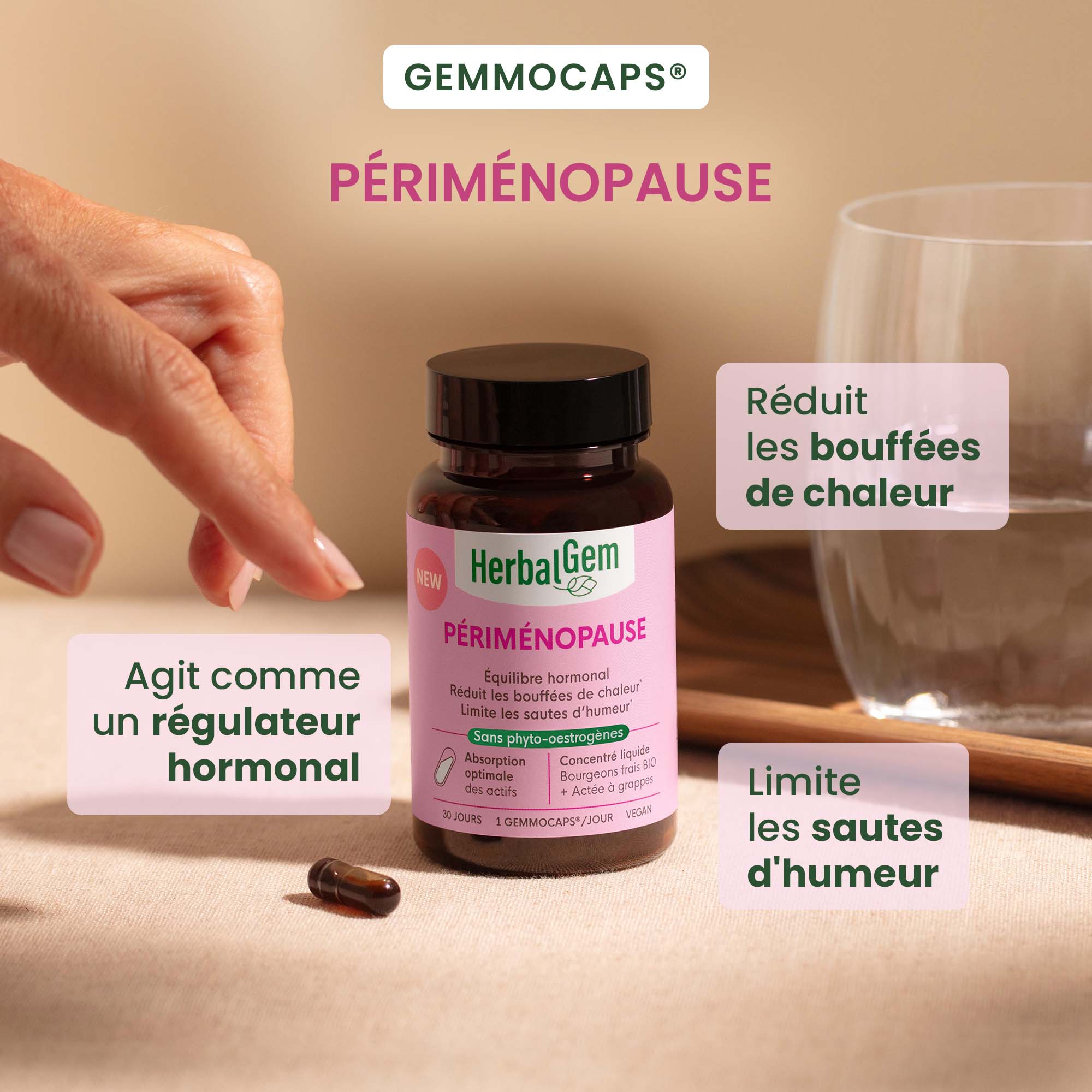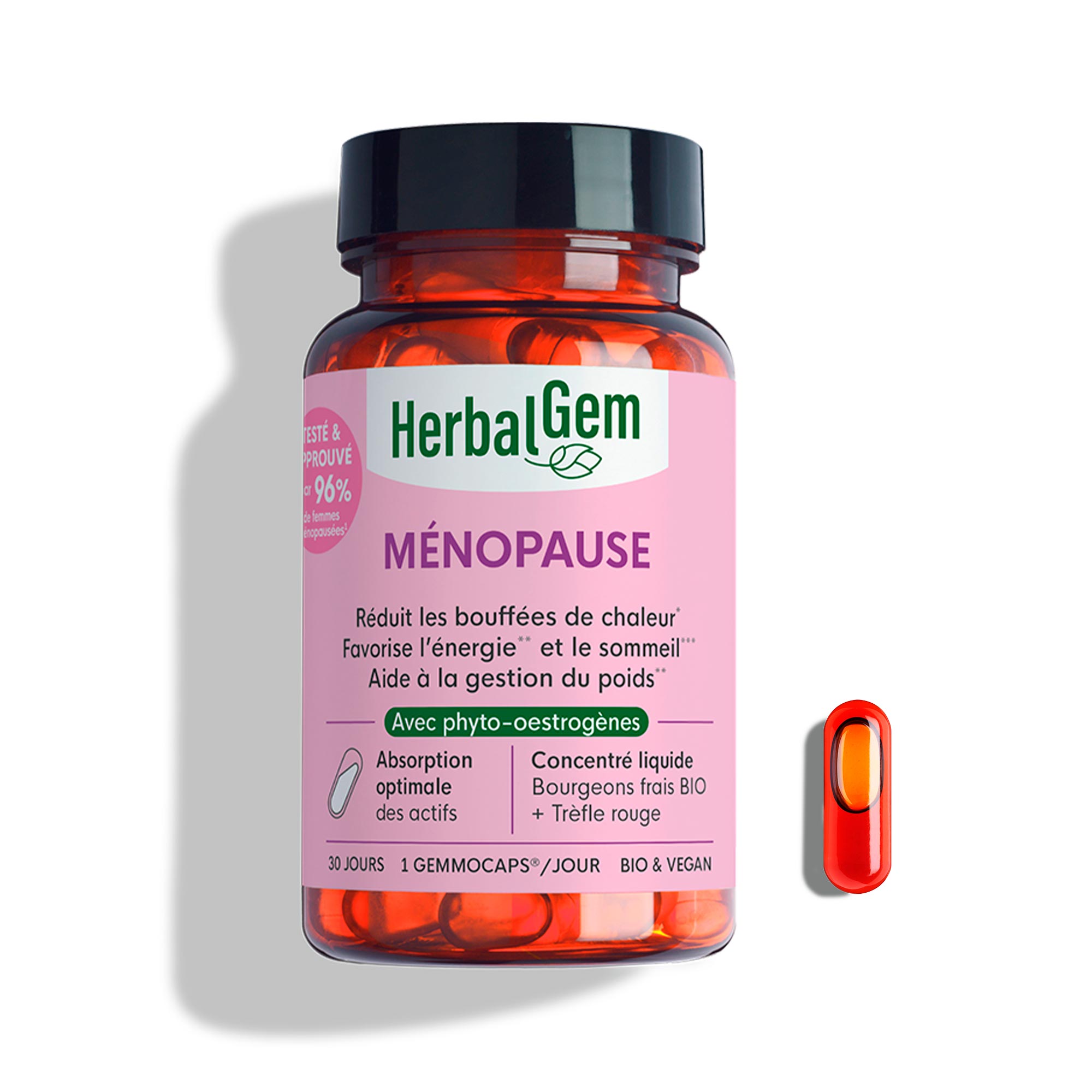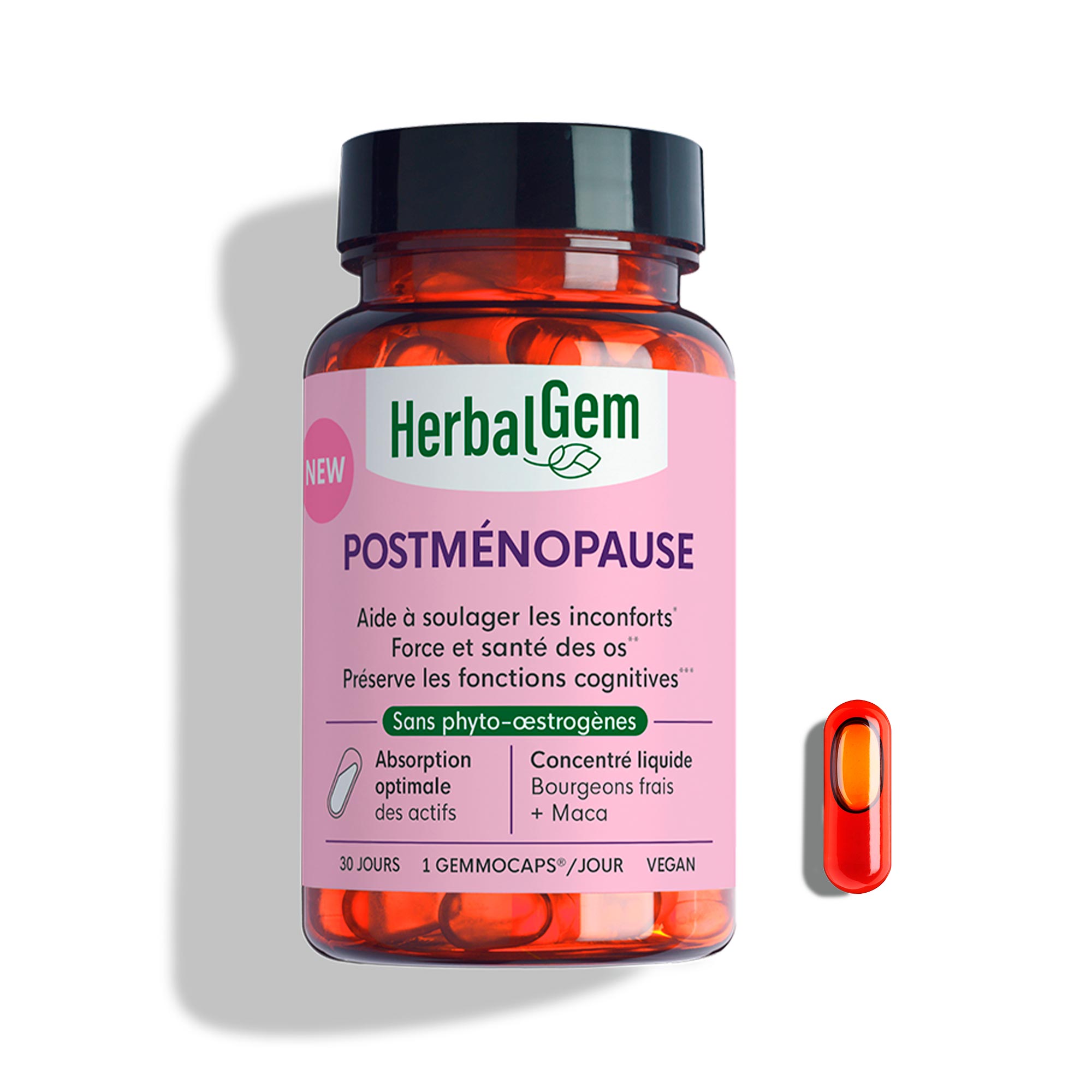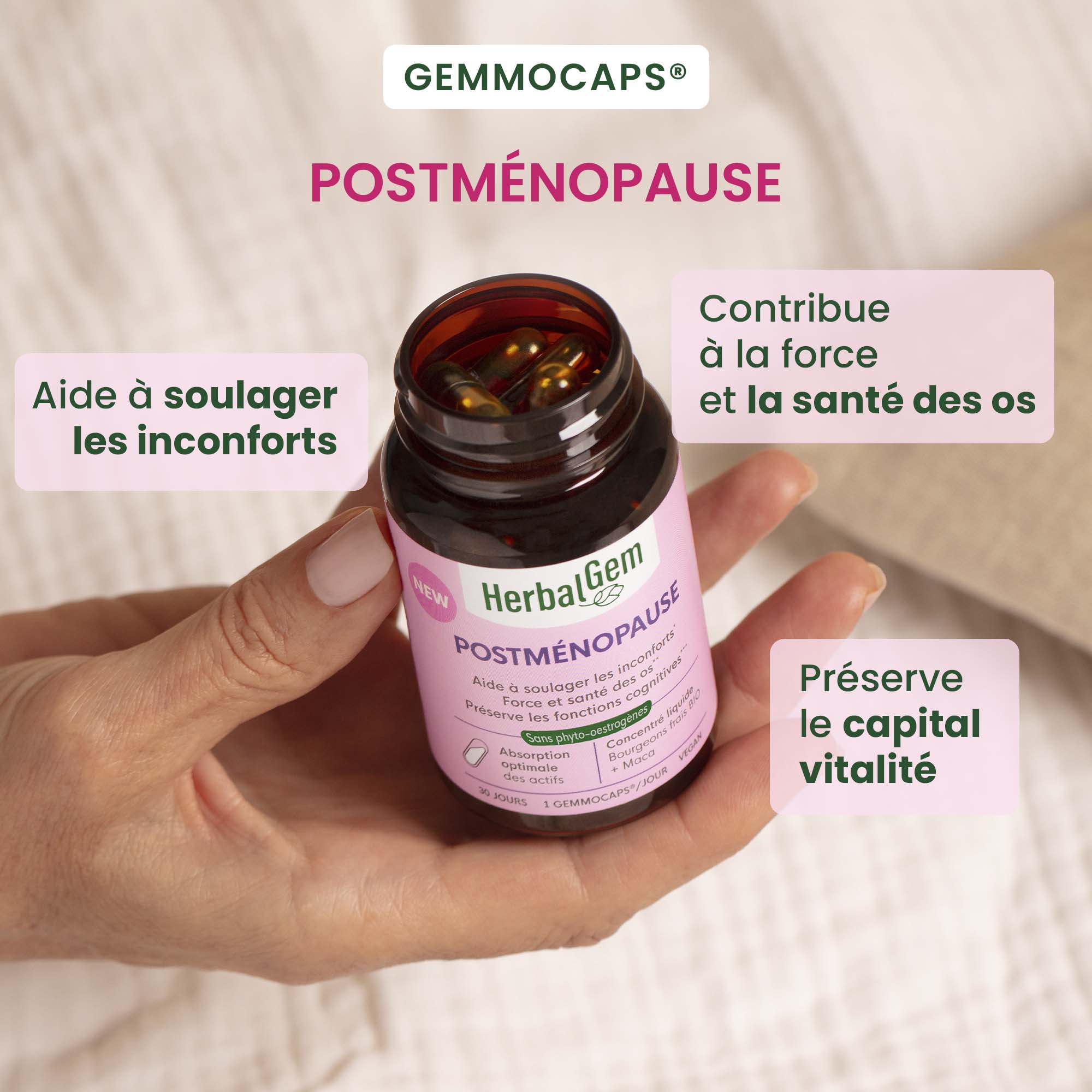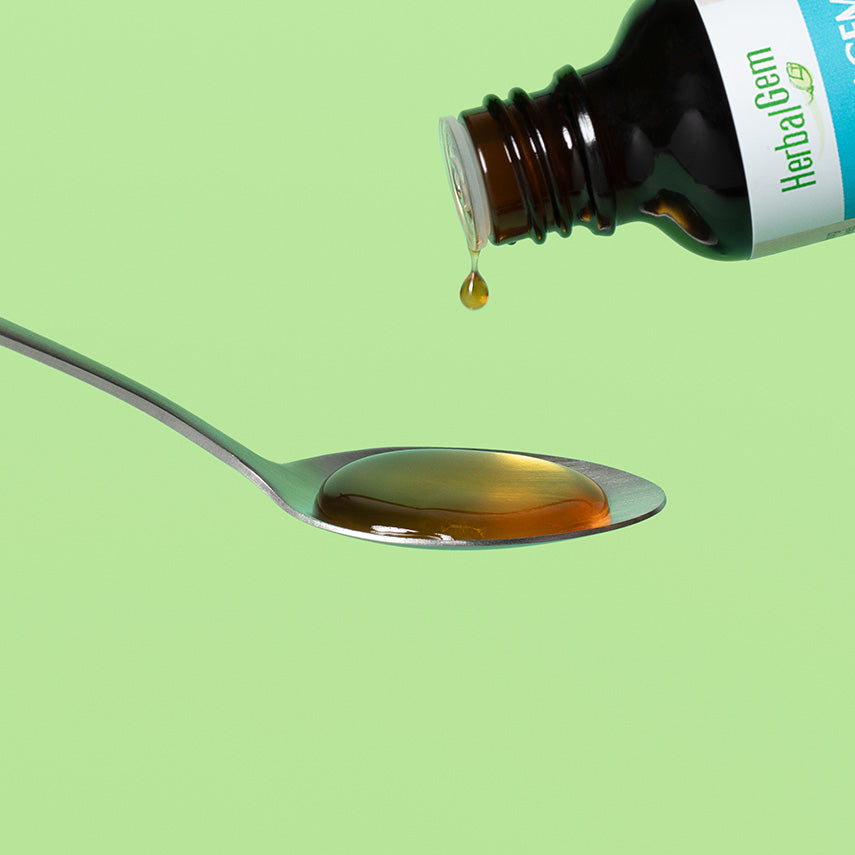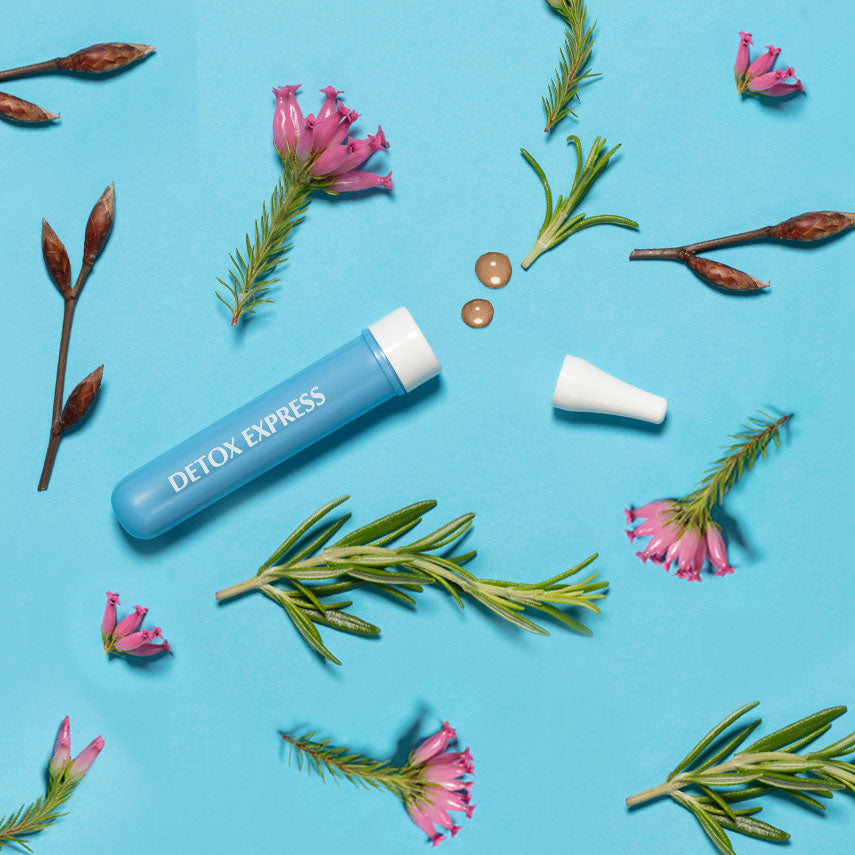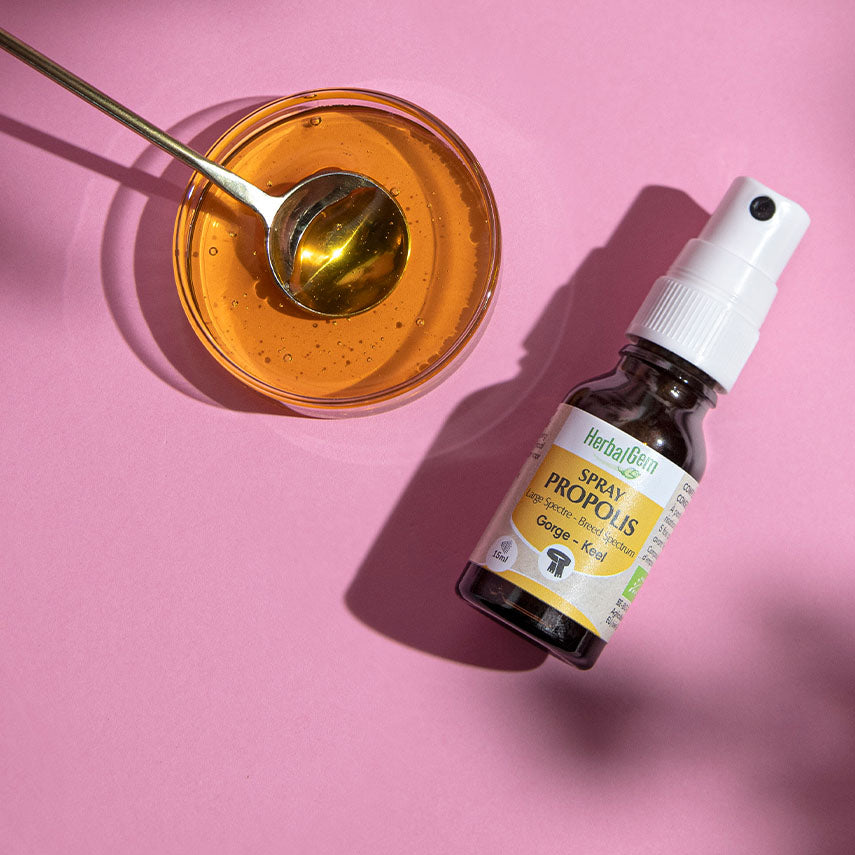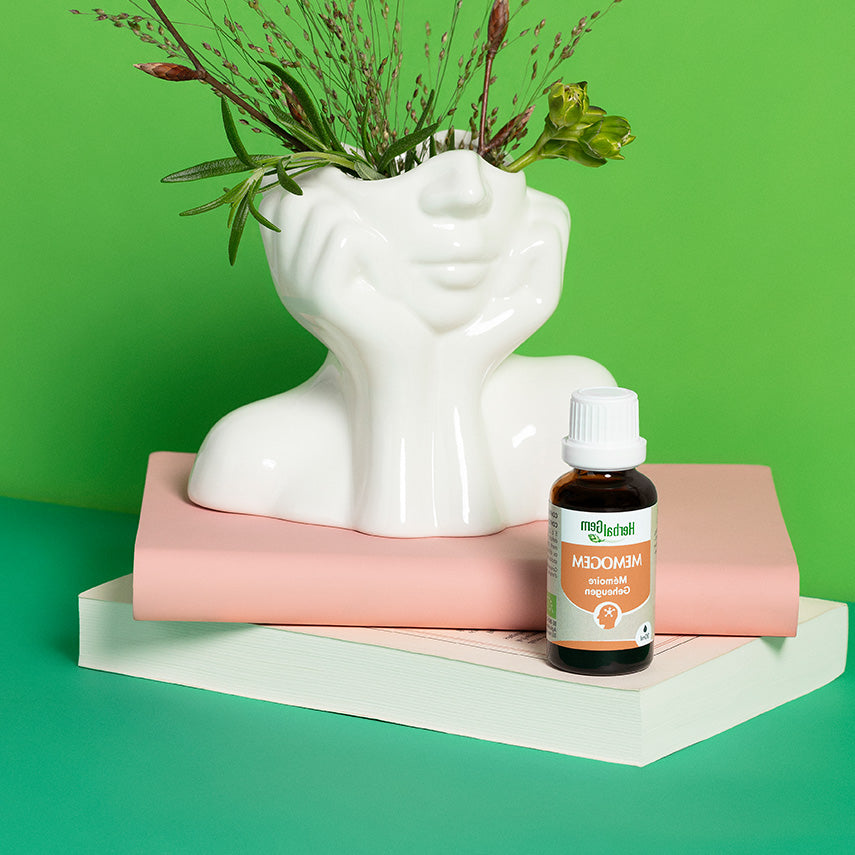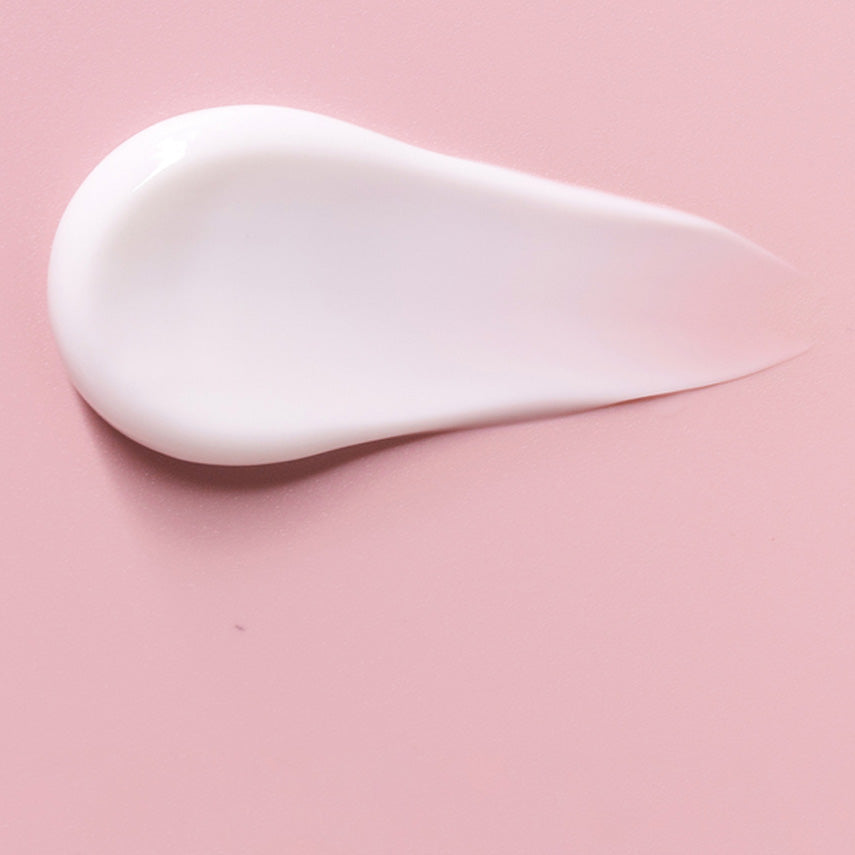CONFORT PRÉMENSTRUEL & PÉRIMÉNOPAUSE
Complément alimentaire SPM & confort menstruel - Bio
Le complément alimentaire SPM : pour en finir avec les inconforts (pré) menstruels et aider à régulariser les cycles.
Complément alimentaire Périménopause
Pour réguler les premiers signes annonciateurs de la ménopause. Réduit les bouffées de chaleur et limite les sautes d'humeur.
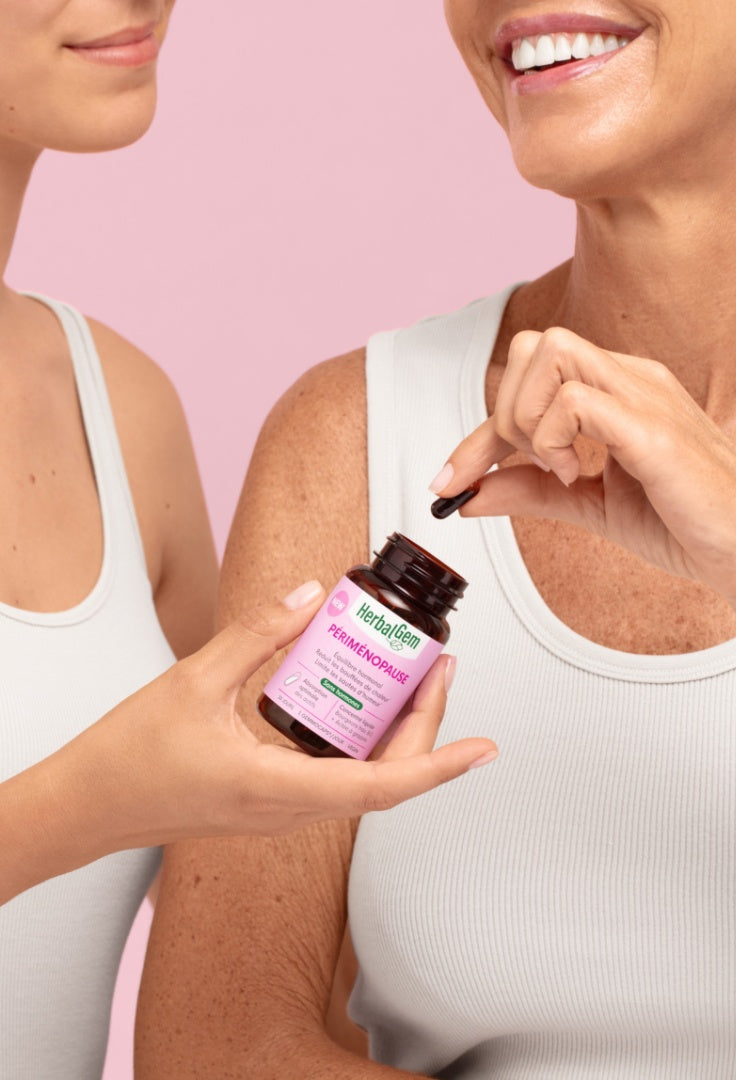
MÉNOPAUSE & POSTMÉNOPAUSE
Complément alimentaire Ménopause - Bio
Réduit les bouffées de chaleur, favorise l'énergie et le sommeil. Ce complément alimentaire aide à la gestion du poids en période de ménopause.
Complément alimentaire Postménopause
Aide à soulager les inconforts de la postménopause. Contribue à la force et santé des os et préserve les fonction cognitives.
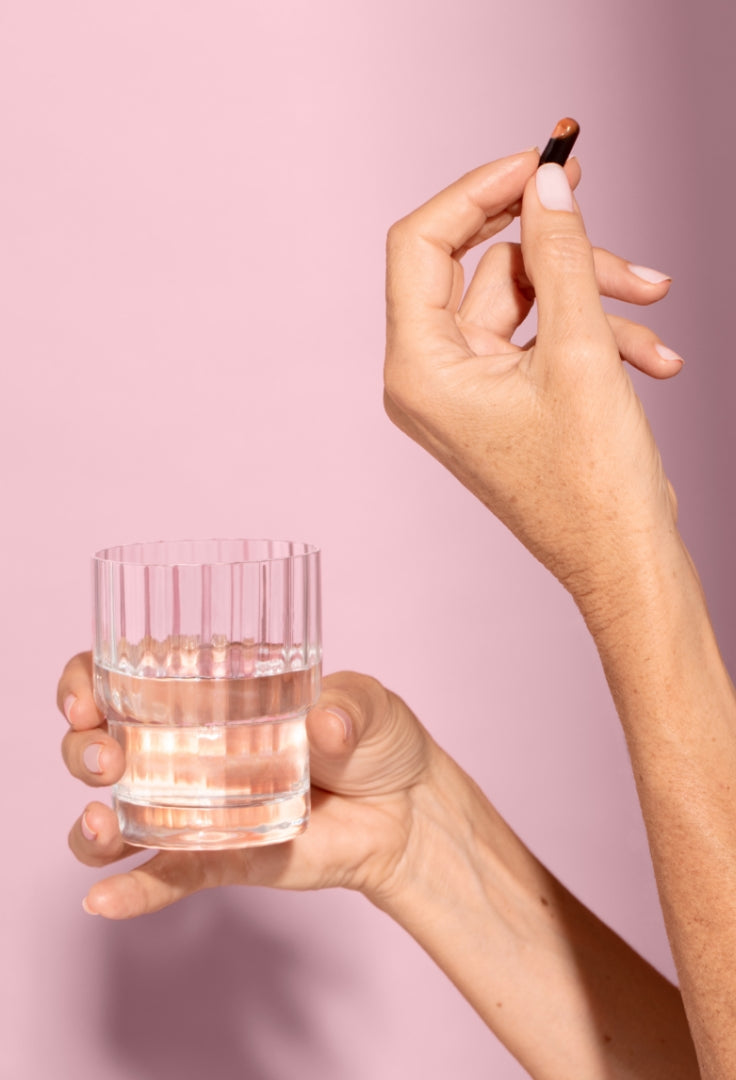
Cycle féminin - Nos conseils

Comment bien vivre naturellement sa ménopause au quotidien ?
Chaque femme passe un jour par cette transition naturelle. Un peu plus tôt pour certaines, un peu plus tard chez d’autres : la ménopause. Suite à cette chute hormonale, plusieurs symptômes apparaissent comme les bouffées de chaleur, la prise de poids, les troubles urinaires ou encore l’anxiété, etc.

How to relieve dysmenorrhea?
Dysmenorrhea , better known as menstrual pain , affects many women around the world. This disorder is often overlooked, even though it can be disabling and seriously disrupt daily life. How to relieve dysmenorrhea ? Definition, causes and symptoms, natural approaches: discover how to find more comfort and well-being during your menstrual cycle. What is dysmenorrhea? Dysmenorrhea is characterized by severe pelvic pain during menstruation. It is generally classified into two types: Primary dysmenorrhea : This is menstrual pain with no identifiable underlying cause. It usually appears a few years after the first menstrual period and tends to diminish with age or after pregnancy. Secondary dysmenorrhea : This form is linked to underlying gynecological conditions, such as endometriosis, uterine fibroids or pelvic infections. The pain is often more intense and can appear at any time during reproductive life. In addition to pelvic pain, symptoms of dysmenorrhea may include nausea, vomiting, diarrhea, and general fatigue. Diagnosis of dysmenorrhea is based primarily on the patient's clinical history , so it is important to take the time to understand her menstrual cycle . A physical examination may also be necessary to rule out other medical conditions, and additional testing is sometimes recommended to identify secondary dysmenorrhea. Painful periods: what are the causes? Primary dysmenorrhea is usually associated with excessive production of prostaglandins , chemicals that cause the uterus to contract. These contractions can be intense enough to reduce blood supply to the uterus, leading to painful cramps during menstruation. Secondary dysmenorrhea is often the result of problems affecting the reproductive organs. Some of the main causes include: Endometriosis : Tissue similar to the lining of the uterus grows outside the uterus. This tissue reacts to menstrual hormones, which can lead to significant inflammation and pain during menstruation, as the ectopic tissue can bleed and cause irritation. Adenomyosis : This condition is characterized by the growth of the uterine lining inside the muscles of the uterus. During menstruation, this can cause heavier bleeding and more severe pain than normal. Uterine fibroids : These benign tumors can grow inside the uterus, on its walls, or outside. Depending on their location and size, they can cause pain and abnormal bleeding. Endometrial polyps : These small growths on the wall of the uterus can increase bleeding and pain during periods. Problems with intrauterine contraception : An improperly positioned intrauterine device (IUD) can cause pain. Similarly, some types of hormonal contraception may not be suitable for all women and may cause unpleasant symptoms. Raspberry bud to better manage dysmenorrhea Raspberry bud is a natural remedy that is gaining popularity for the management of menstrual disorders , including dysmenorrhea. This bud, from the raspberry plant (Rubus idaeus), is used in gemmotherapy, a branch of herbal medicine that focuses on the use of the embryonic tissues of plants. Thus, raspberry bud is used for its regulating properties on the female hormonal system . It is considered a "balancing" plant for the reproductive system, supporting both the menstrual cycle and uterine health. It is rich in tannins, flavonoids, and organic acids, which are recognized for their antioxidant and anti-inflammatory properties . Raspberry bud is therefore particularly appreciated for its ability to intervene in the regulation of irregular menstrual cycles and to support the reduction of menstrual pain associated with dysmenorrhea . Here is how this natural bud concentrate can participate in the management of symptoms: Due to its antispasmodic properties, it also helps to relax the muscles of the uterus , which can help reduce menstrual cramps. By soothing excessive contractions, it can therefore help alleviate the intense pain often felt during episodes of dysmenorrhea. Other Natural Approaches to Relieve Menstrual Pain To relieve dysmenorrhea, many women prefer to turn to more natural solutions to avoid the side effects of these nonsteroidal anti-inflammatory drugs (NSAIDs) and hormonal contraceptives. Here are some wellness avenues to explore in addition to approaches related to gemmotherapy: Diet and hydration : Eating a balanced diet rich in fruits, vegetables, and whole grains can help reduce inflammation. Hydration is also crucial. For example, drinking enough water can help reduce the severity of menstrual cramps; Exercise : While it may seem counterintuitive, light exercise like yoga or walking can help reduce menstrual pain. That's because physical activity promotes circulation and the production of endorphins, the body's natural painkillers; Relaxation techniques : Methods such as meditation, deep breathing and yoga can play a role in managing stress and reducing the perception of pain; Complementary therapies : Acupuncture and massage are often used to help relieve menstrual pain from dysmenorrhea. These practices can help relax the uterine muscles and promote circulation in the pelvic area. Please note that it is essential to consult a physician for a proper diagnosis and to discuss any approach to managing dysmenorrhea. Some underlying conditions (such as endometriosis) require a specific medical approach. When to consult in case of pain during periods? If you suffer from dysmenorrhea, it is important to make an appointment with your doctor when you experience the following situations regarding your period: Menstrual pain does not improve despite use of nonsteroidal anti-inflammatory drugs (NSAIDs); You start experiencing menstrual pain as an adult when your periods were not painful before; The pain intensifies abnormally; The pain lasts for several days, occurring before (premenstrual syndrome) and after your period; Menstrual pain has a significant impact on your daily life, resulting in missed school or work. It is also crucial to seek medical attention if your painful periods are accompanied by the following symptoms: Fever ; Unusual vaginal discharge, such as thick, yellowish discharge; Bleeding between periods; Excessively heavy periods; Pain during sexual intercourse; Symptoms of irritable bowel syndrome or other digestive disorders. These symptoms may be signs of underlying conditions that require medical evaluation for proper diagnosis and treatment to relieve PCOS symptoms.

The 7 symptoms of menopause
What are the symptoms of menopause? Menopause marks a major turning point in a woman's life, usually between the ages of 45 and 55. It's a transitional period when menstruation stops for good, but it's accompanied by significant hormonal changes . The drop in estrogen and progesterone often causes a range of uncomfortable symptoms, both physically and emotionally. Fortunately, there are natural ways to relieve menopause symptoms : learn more. What are the symptoms of menopause? 1. Hot flashes and night sweats Hot flashes are one of the most common symptoms of menopause. They are characterized by a sudden feeling of intense heat, often followed by profuse sweating. These episodes can occur at any time of the day, but also during the night, which can cause night sweats . These symptoms are directly related to hormonal fluctuations, particularly the drop in estrogen levels, which affects the body's thermal regulation system. 2. Sleep disorders Hormonal changes associated with menopause can disrupt the sleep cycle . Many women complain of insomnia, frequent nighttime awakenings, or unrefreshing sleep. Nighttime hot flashes and sweating can also aggravate these problems. Disrupted sleep can then lead to chronic fatigue and affect the quality of life of the menopausal woman. 3. Vaginal dryness and urinary discomfort The drop in estrogen also affects vaginal and urinary tissues, causing vaginal dryness . This can lead to pain during intercourse, itching, or burning. Urinary problems (such as frequent urination or repeated urinary tract infections) are also common. 4. Mood swings and emotional disturbances Hormonal fluctuations can also affect mood. Women going through menopause often report mood swings , irritability, anxiety, and even depressive episodes. This emotional imbalance is often compounded by fatigue related to sleep disturbances and physical discomfort. 5. Weight gain and body shape changes Menopause often causes weight gain , especially around the abdomen. This is due to a slowdown in metabolism and a redistribution of fat caused by hormonal changes. These changes can be frustrating for some women, but they are part of the natural transformations associated with this phase of life. 6. Decreased bone density and risk of osteoporosis The decrease in estrogen directly impacts bone health . Women going through menopause are more prone to rapid bone loss , which increases the risk of osteoporosis. This bone fragility can lead to fractures, particularly in the hips, wrists, or spine. 7. Skin and hair problems Hormonal changes can also affect the quality of skin and hair. Women going through menopause often notice drier, less elastic skin, as well as hair loss or thinning hair. These symptoms (although only cosmetic) can affect self-confidence. What is the first sign of menopause? The first sign of menopause is often an irregular menstrual cycle. Periods become unpredictable, less frequent, or heavier before stopping completely. This phase, called perimenopause , can last for several years and is accompanied by other symptoms such as hot flashes, sleep disturbances, and mood swings. These changes are due to the gradual decrease in estrogen levels in the body. Each woman experiences this transition differently, but irregular periods are the first classic indicator that menopause is approaching. How to relieve menopause symptoms? Bud macerates Bud macerates can support the body in the face of hormonal imbalances. For example, apple bud is traditionally used to soothe hot flashes and better manage emotions. In addition, hawthorn bud can help reduce stress and promote restful sleep, aspects often disrupted by menopause. Birch sap Birch sap, known for its purifying and revitalizing properties , can also help manage menopausal symptoms. By supporting the elimination of toxins and providing essential minerals, it helps maintain overall vitality. In addition, it can support joint health , an aspect often affected by hormonal decline. Propolis Propolis, a beehive product, has antioxidant properties that can help maintain good overall health during menopause. By supporting the body's natural defenses, it contributes to overall well-being and can soothe discomforts associated with hormonal changes. Herbalgem Solution to Alleviate Menopause Symptoms Herbalgem offers a natural and effective solution to help women live through menopause with the Fem50+GEM BIO complex. This product has been specially formulated to alleviate the discomforts associated with menopause , such as hot flashes, intimate dryness, sleep disorders and joint pain. Thanks to the synergistic action of 5 plants, this complex accompanies women by offering comprehensive support. The bud of young cranberry shoots acts against hormonal discomfort, while the apple bud supports emotional balance. The bramble bud contributes to joint well-being, often compromised during menopause. In addition, the hawthorn bud helps to soothe sleep disturbances and stress, and the sage mother tincture plays a role in regulating excessive sweating and hormonal balance. Unlike tablets, Herbalgem liquid solutions are rapidly absorbed by the body, for optimal effectiveness. With Fem50+GEM BIO, Herbalgem offers a natural approach to alleviate menopause symptoms and support women's daily well-being. How to adapt your lifestyle to reduce the signs of menopause? Adopt a balanced diet A diet rich in calcium and vitamin D is essential for maintaining bone health. Dairy products, oily fish, green leafy vegetables such as kale or broccoli: they can help you prevent osteoporosis which is accentuated by menopause. Antioxidants (found in fruits and vegetables) also play a key role in protecting the skin and supporting the immune system. Practice regular physical activity Physical exercise ( such as walking, yoga, or swimming) is important for maintaining good bone density, preventing weight gain, and regulating mood. Additionally, physical activity promotes better sleep and helps manage stress, which can help relieve some symptoms of menopause. Managing stress and taking care of the quality of your sleep Taking care of your mental well-being is just as important, whether you are going through menopause or post-menopause . Practices like meditation, deep breathing or even relaxation techniques can help you better manage stress . A peaceful sleep environment, free of distractions, can provide a better quality of nighttime rest. When to see a doctor? It is essential to consult a doctor or gynaecologist if menopause symptoms become too bothersome or affect quality of life. Hormone replacement therapy (HRT) can be considered to alleviate some symptoms, but these treatments must be prescribed and closely monitored by a healthcare professional due to potential health risks, including an increased risk of cancer or cardiovascular disease. It is therefore important to discuss all options (including natural alternatives such as Herbelgem) with a specialist.








